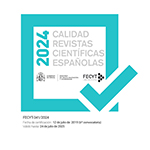La poética de la analogía y del fragmento en la poesía de Govoni
Resumen
The analogy’s and objects’s poetics, inheritated from D’Annunzio’s and Pascoli’s symbolism, meet in Govoni’s poetry. This poet manifests his own poetic identity through these both traditions but at the same time he is able “to cross” them in a personal way. At the first stage, the objects’s poetic, as fragment’s poetic, is expressed in the highest degree under the form of the “cataloghe-poem” and the “litany-poem”; then follows a more dynamic and free use of images which in a explicit way presents in the poem the effect of a totality. Finally, in the age of maturity, the pure analogy’s poetic imposes itself: the poem rises from a nucleus of images and its frame corresponds closely to the dynamism of the analogy. We examine in this essay specially the forms of the fragment’s poetic: the list of objects and the juxtaposition of images, and at the end we offer a series of considerations about the analogy’s poetic. Simultaneously we try to draw an itinerary of Govoni’s poetry and a portrait of his identity, how the sensorial function, which defines his personality, relates with other functions of the conscience, like sentiment, thought and intuition.Descargas
Descarga artículo
Licencia
La revista Cuadernos de Filología Italiana, para fomentar el intercambio global del conocimiento, facilita el acceso sin restricciones a sus contenidos desde el momento de su publicación en la presente edición electrónica, y por eso es una revista de acceso abierto. Los originales publicados en esta revista son propiedad de la Universidad Complutense de Madrid y es obligatorio citar su procedencia en cualquier reproducción total o parcial. Todos los contenidos se distribuyen bajo una licencia de uso y distribución Creative Commons Reconocimiento 4.0 (CC BY 4.0). Esta circunstancia ha de hacerse constar expresamente de esta forma cuando sea necesario. Puede consultar la versión informativa y el texto legal de la licencia.










